BLO1105 Business Law VU Sydney: Contract & Consumer Law Report
VerifiedAdded on 2023/06/12
|11
|2488
|305
Report
AI Summary
This assignment provides a comprehensive analysis of contract law, focusing on the elements of offer and acceptance to determine whether a valid contract was formed between Magda and Avinash. It examines relevant case law such as Fisher v Bell, Hyde v Wrench, and Ramsgate Victoria Hotel v Montefiore to analyze the validity of offers, counteroffers, and acceptance timelines. Additionally, the assignment explores potential violations of the Australian Consumer Law (ACL) by Magda, specifically concerning misleading and deceptive conduct under s. 18 and compliance with product descriptions under s. 56, with reference to ACCC v Reckitt Benckiser. The rights of the consumer, Elton, are also discussed in relation to guarantees, refunds, repairs, and replacements under the ACL. The document also discusses the validity of consideration in contract law, referencing cases like Thomas v Thomas, Pao On v Lau Yiu Long, and Stilk v Myrick to illustrate rules regarding past consideration, sufficiency, existing duties, and part payments.
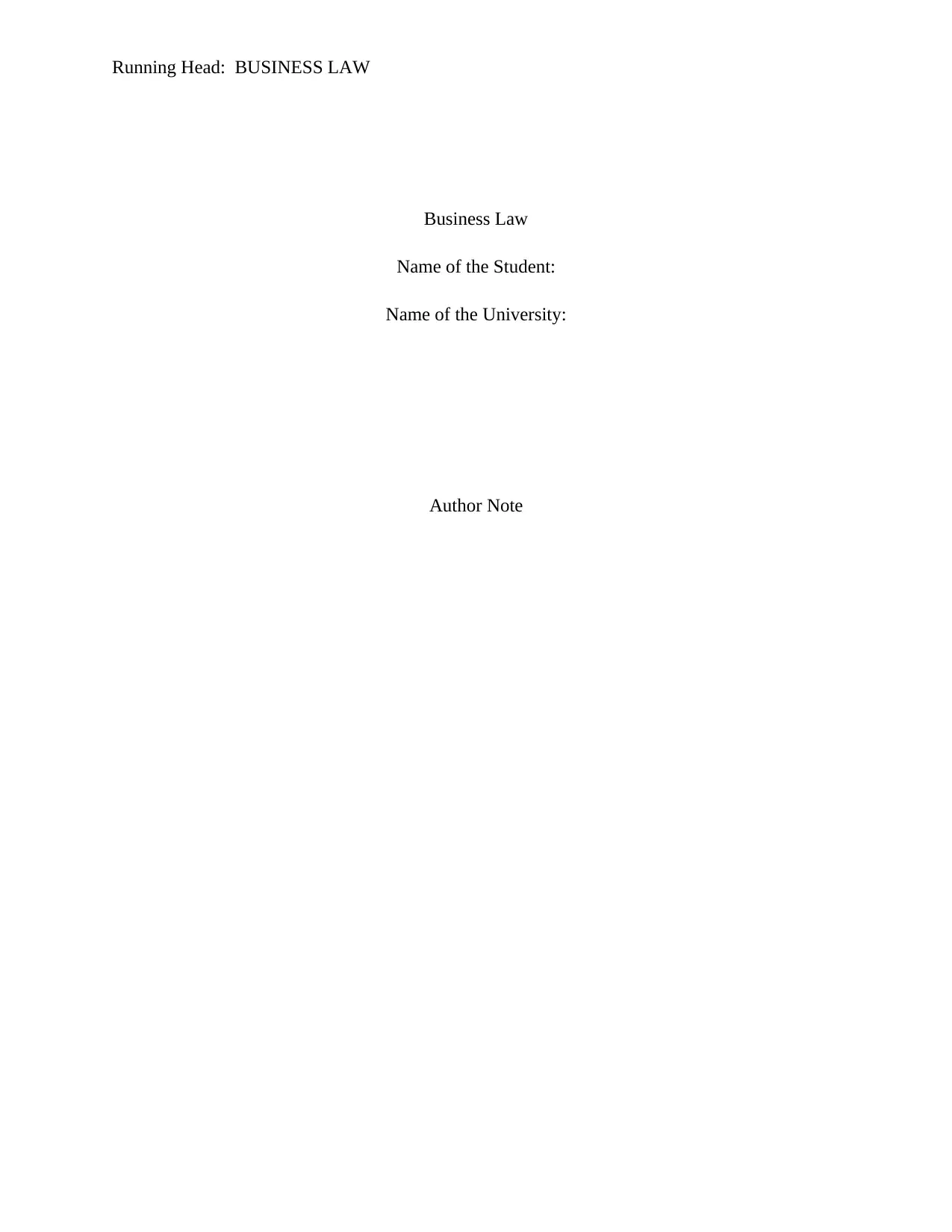
Running Head: BUSINESS LAW
Business Law
Name of the Student:
Name of the University:
Author Note
Business Law
Name of the Student:
Name of the University:
Author Note
Paraphrase This Document
Need a fresh take? Get an instant paraphrase of this document with our AI Paraphraser
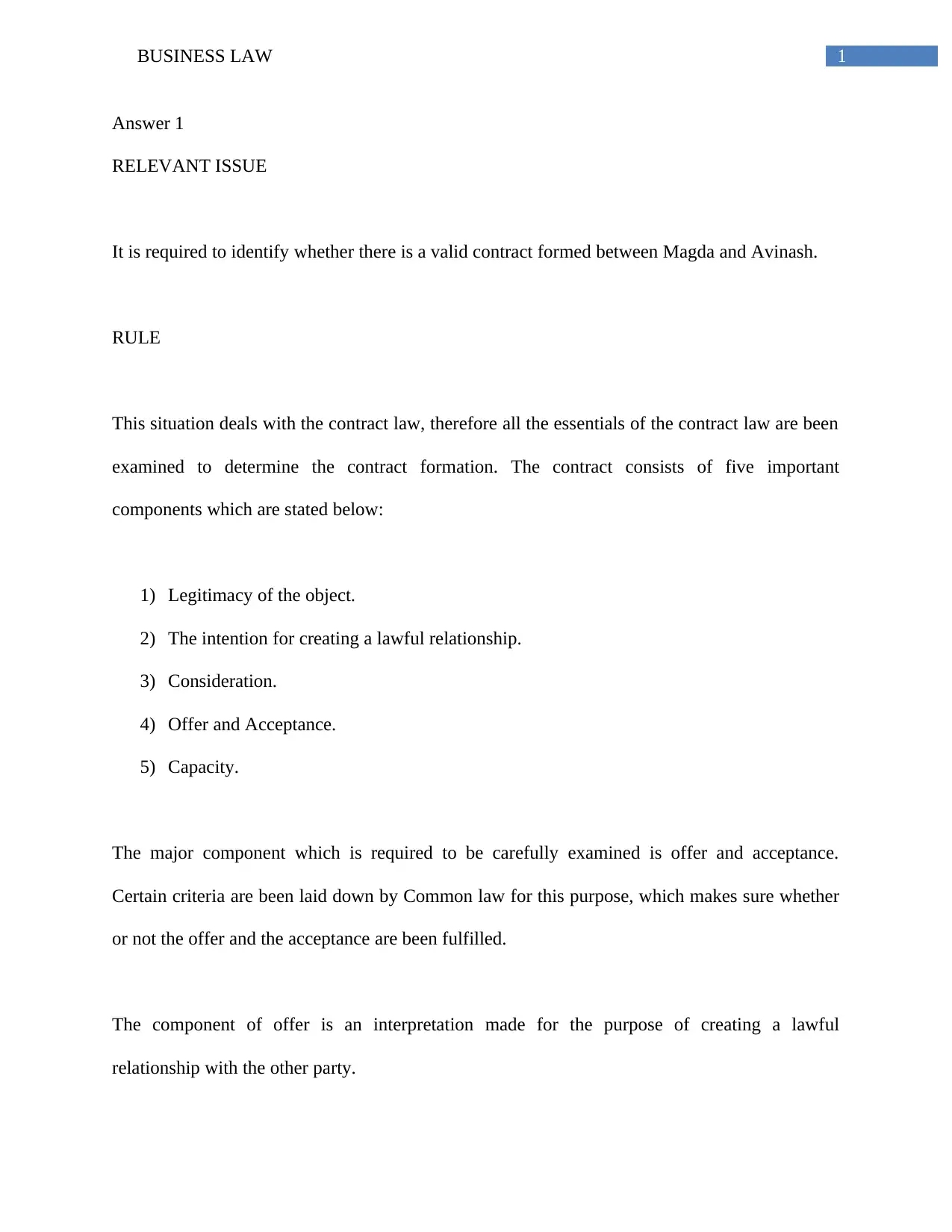
1BUSINESS LAW
Answer 1
RELEVANT ISSUE
It is required to identify whether there is a valid contract formed between Magda and Avinash.
RULE
This situation deals with the contract law, therefore all the essentials of the contract law are been
examined to determine the contract formation. The contract consists of five important
components which are stated below:
1) Legitimacy of the object.
2) The intention for creating a lawful relationship.
3) Consideration.
4) Offer and Acceptance.
5) Capacity.
The major component which is required to be carefully examined is offer and acceptance.
Certain criteria are been laid down by Common law for this purpose, which makes sure whether
or not the offer and the acceptance are been fulfilled.
The component of offer is an interpretation made for the purpose of creating a lawful
relationship with the other party.
Answer 1
RELEVANT ISSUE
It is required to identify whether there is a valid contract formed between Magda and Avinash.
RULE
This situation deals with the contract law, therefore all the essentials of the contract law are been
examined to determine the contract formation. The contract consists of five important
components which are stated below:
1) Legitimacy of the object.
2) The intention for creating a lawful relationship.
3) Consideration.
4) Offer and Acceptance.
5) Capacity.
The major component which is required to be carefully examined is offer and acceptance.
Certain criteria are been laid down by Common law for this purpose, which makes sure whether
or not the offer and the acceptance are been fulfilled.
The component of offer is an interpretation made for the purpose of creating a lawful
relationship with the other party.
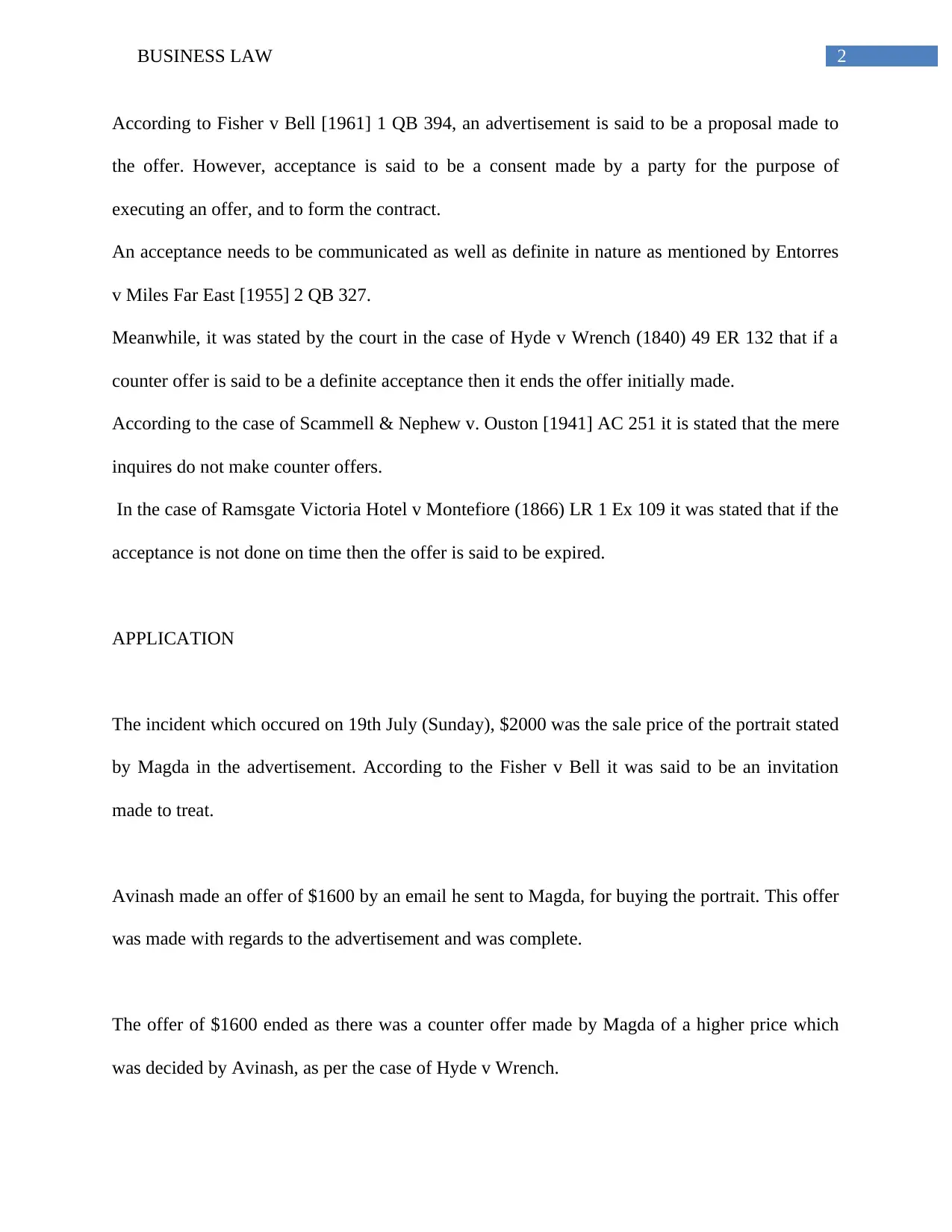
2BUSINESS LAW
According to Fisher v Bell [1961] 1 QB 394, an advertisement is said to be a proposal made to
the offer. However, acceptance is said to be a consent made by a party for the purpose of
executing an offer, and to form the contract.
An acceptance needs to be communicated as well as definite in nature as mentioned by Entorres
v Miles Far East [1955] 2 QB 327.
Meanwhile, it was stated by the court in the case of Hyde v Wrench (1840) 49 ER 132 that if a
counter offer is said to be a definite acceptance then it ends the offer initially made.
According to the case of Scammell & Nephew v. Ouston [1941] AC 251 it is stated that the mere
inquires do not make counter offers.
In the case of Ramsgate Victoria Hotel v Montefiore (1866) LR 1 Ex 109 it was stated that if the
acceptance is not done on time then the offer is said to be expired.
APPLICATION
The incident which occured on 19th July (Sunday), $2000 was the sale price of the portrait stated
by Magda in the advertisement. According to the Fisher v Bell it was said to be an invitation
made to treat.
Avinash made an offer of $1600 by an email he sent to Magda, for buying the portrait. This offer
was made with regards to the advertisement and was complete.
The offer of $1600 ended as there was a counter offer made by Magda of a higher price which
was decided by Avinash, as per the case of Hyde v Wrench.
According to Fisher v Bell [1961] 1 QB 394, an advertisement is said to be a proposal made to
the offer. However, acceptance is said to be a consent made by a party for the purpose of
executing an offer, and to form the contract.
An acceptance needs to be communicated as well as definite in nature as mentioned by Entorres
v Miles Far East [1955] 2 QB 327.
Meanwhile, it was stated by the court in the case of Hyde v Wrench (1840) 49 ER 132 that if a
counter offer is said to be a definite acceptance then it ends the offer initially made.
According to the case of Scammell & Nephew v. Ouston [1941] AC 251 it is stated that the mere
inquires do not make counter offers.
In the case of Ramsgate Victoria Hotel v Montefiore (1866) LR 1 Ex 109 it was stated that if the
acceptance is not done on time then the offer is said to be expired.
APPLICATION
The incident which occured on 19th July (Sunday), $2000 was the sale price of the portrait stated
by Magda in the advertisement. According to the Fisher v Bell it was said to be an invitation
made to treat.
Avinash made an offer of $1600 by an email he sent to Magda, for buying the portrait. This offer
was made with regards to the advertisement and was complete.
The offer of $1600 ended as there was a counter offer made by Magda of a higher price which
was decided by Avinash, as per the case of Hyde v Wrench.
⊘ This is a preview!⊘
Do you want full access?
Subscribe today to unlock all pages.

Trusted by 1+ million students worldwide
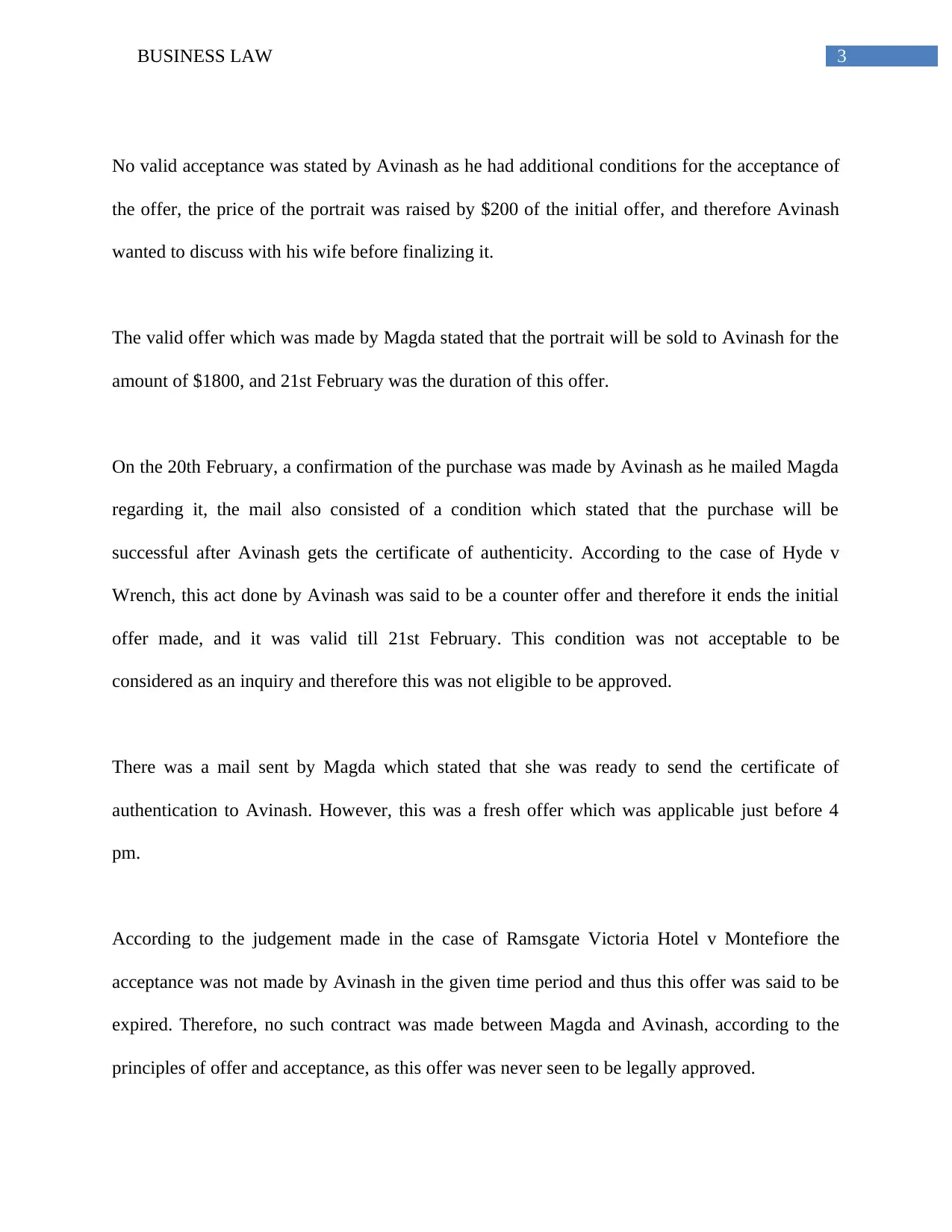
3BUSINESS LAW
No valid acceptance was stated by Avinash as he had additional conditions for the acceptance of
the offer, the price of the portrait was raised by $200 of the initial offer, and therefore Avinash
wanted to discuss with his wife before finalizing it.
The valid offer which was made by Magda stated that the portrait will be sold to Avinash for the
amount of $1800, and 21st February was the duration of this offer.
On the 20th February, a confirmation of the purchase was made by Avinash as he mailed Magda
regarding it, the mail also consisted of a condition which stated that the purchase will be
successful after Avinash gets the certificate of authenticity. According to the case of Hyde v
Wrench, this act done by Avinash was said to be a counter offer and therefore it ends the initial
offer made, and it was valid till 21st February. This condition was not acceptable to be
considered as an inquiry and therefore this was not eligible to be approved.
There was a mail sent by Magda which stated that she was ready to send the certificate of
authentication to Avinash. However, this was a fresh offer which was applicable just before 4
pm.
According to the judgement made in the case of Ramsgate Victoria Hotel v Montefiore the
acceptance was not made by Avinash in the given time period and thus this offer was said to be
expired. Therefore, no such contract was made between Magda and Avinash, according to the
principles of offer and acceptance, as this offer was never seen to be legally approved.
No valid acceptance was stated by Avinash as he had additional conditions for the acceptance of
the offer, the price of the portrait was raised by $200 of the initial offer, and therefore Avinash
wanted to discuss with his wife before finalizing it.
The valid offer which was made by Magda stated that the portrait will be sold to Avinash for the
amount of $1800, and 21st February was the duration of this offer.
On the 20th February, a confirmation of the purchase was made by Avinash as he mailed Magda
regarding it, the mail also consisted of a condition which stated that the purchase will be
successful after Avinash gets the certificate of authenticity. According to the case of Hyde v
Wrench, this act done by Avinash was said to be a counter offer and therefore it ends the initial
offer made, and it was valid till 21st February. This condition was not acceptable to be
considered as an inquiry and therefore this was not eligible to be approved.
There was a mail sent by Magda which stated that she was ready to send the certificate of
authentication to Avinash. However, this was a fresh offer which was applicable just before 4
pm.
According to the judgement made in the case of Ramsgate Victoria Hotel v Montefiore the
acceptance was not made by Avinash in the given time period and thus this offer was said to be
expired. Therefore, no such contract was made between Magda and Avinash, according to the
principles of offer and acceptance, as this offer was never seen to be legally approved.
Paraphrase This Document
Need a fresh take? Get an instant paraphrase of this document with our AI Paraphraser
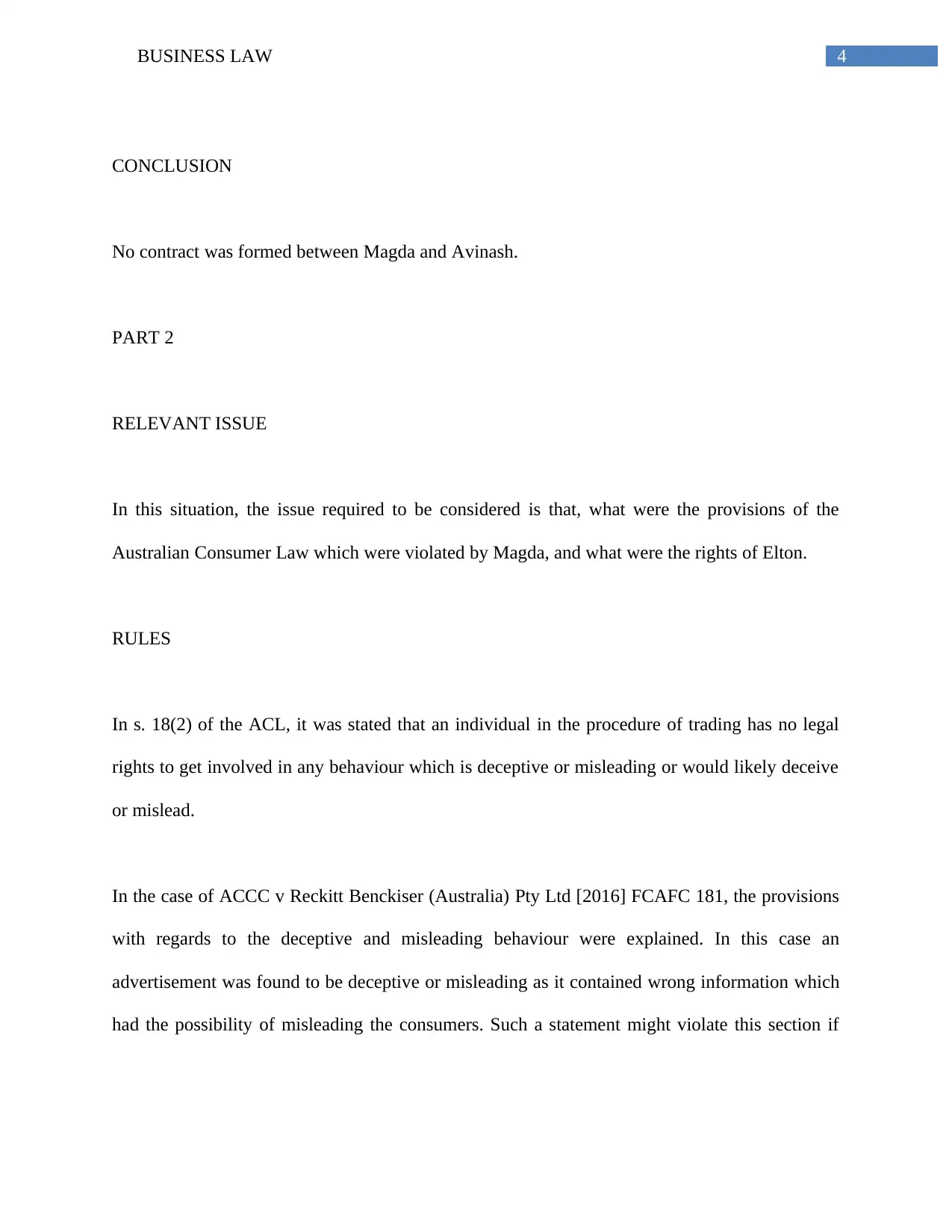
4BUSINESS LAW
CONCLUSION
No contract was formed between Magda and Avinash.
PART 2
RELEVANT ISSUE
In this situation, the issue required to be considered is that, what were the provisions of the
Australian Consumer Law which were violated by Magda, and what were the rights of Elton.
RULES
In s. 18(2) of the ACL, it was stated that an individual in the procedure of trading has no legal
rights to get involved in any behaviour which is deceptive or misleading or would likely deceive
or mislead.
In the case of ACCC v Reckitt Benckiser (Australia) Pty Ltd [2016] FCAFC 181, the provisions
with regards to the deceptive and misleading behaviour were explained. In this case an
advertisement was found to be deceptive or misleading as it contained wrong information which
had the possibility of misleading the consumers. Such a statement might violate this section if
CONCLUSION
No contract was formed between Magda and Avinash.
PART 2
RELEVANT ISSUE
In this situation, the issue required to be considered is that, what were the provisions of the
Australian Consumer Law which were violated by Magda, and what were the rights of Elton.
RULES
In s. 18(2) of the ACL, it was stated that an individual in the procedure of trading has no legal
rights to get involved in any behaviour which is deceptive or misleading or would likely deceive
or mislead.
In the case of ACCC v Reckitt Benckiser (Australia) Pty Ltd [2016] FCAFC 181, the provisions
with regards to the deceptive and misleading behaviour were explained. In this case an
advertisement was found to be deceptive or misleading as it contained wrong information which
had the possibility of misleading the consumers. Such a statement might violate this section if
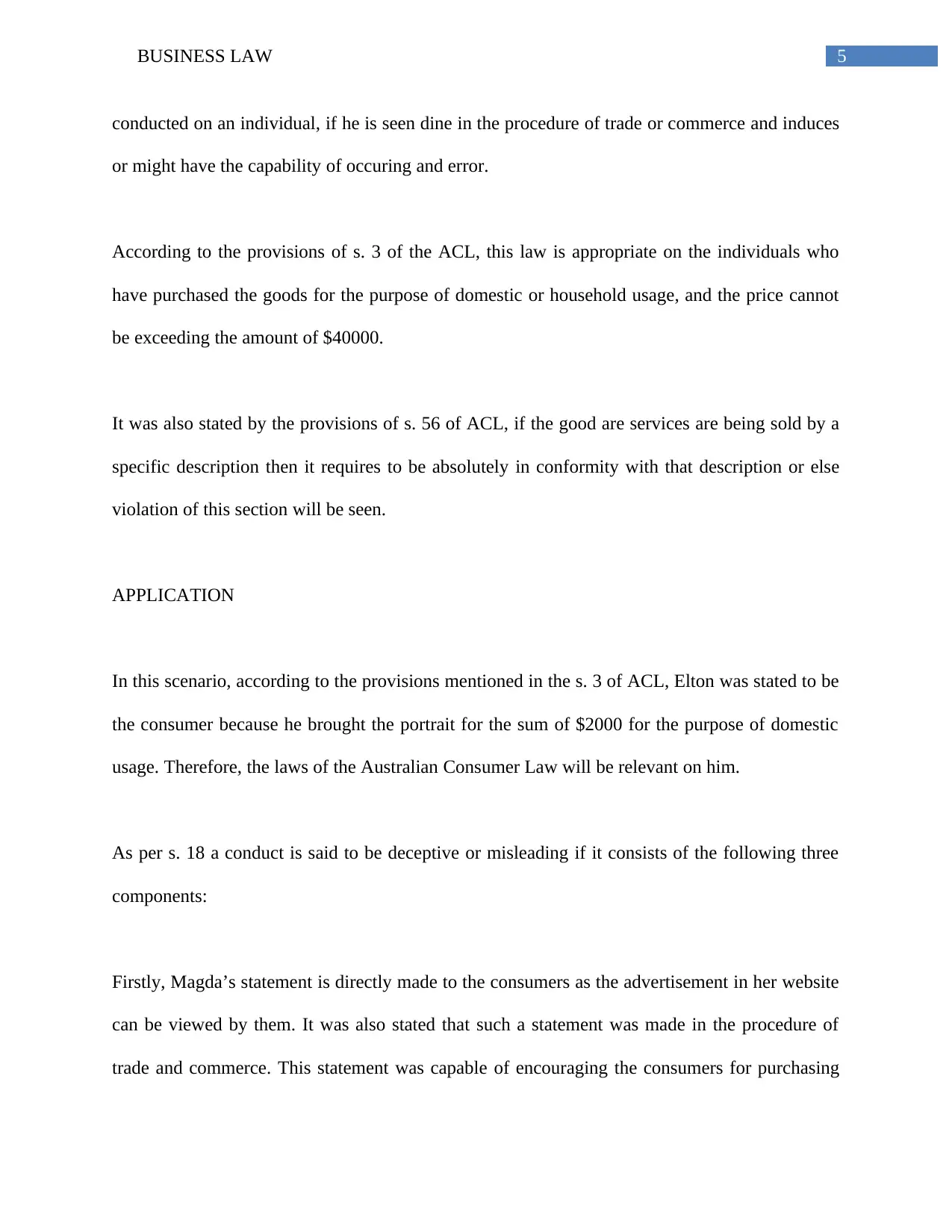
5BUSINESS LAW
conducted on an individual, if he is seen dine in the procedure of trade or commerce and induces
or might have the capability of occuring and error.
According to the provisions of s. 3 of the ACL, this law is appropriate on the individuals who
have purchased the goods for the purpose of domestic or household usage, and the price cannot
be exceeding the amount of $40000.
It was also stated by the provisions of s. 56 of ACL, if the good are services are being sold by a
specific description then it requires to be absolutely in conformity with that description or else
violation of this section will be seen.
APPLICATION
In this scenario, according to the provisions mentioned in the s. 3 of ACL, Elton was stated to be
the consumer because he brought the portrait for the sum of $2000 for the purpose of domestic
usage. Therefore, the laws of the Australian Consumer Law will be relevant on him.
As per s. 18 a conduct is said to be deceptive or misleading if it consists of the following three
components:
Firstly, Magda’s statement is directly made to the consumers as the advertisement in her website
can be viewed by them. It was also stated that such a statement was made in the procedure of
trade and commerce. This statement was capable of encouraging the consumers for purchasing
conducted on an individual, if he is seen dine in the procedure of trade or commerce and induces
or might have the capability of occuring and error.
According to the provisions of s. 3 of the ACL, this law is appropriate on the individuals who
have purchased the goods for the purpose of domestic or household usage, and the price cannot
be exceeding the amount of $40000.
It was also stated by the provisions of s. 56 of ACL, if the good are services are being sold by a
specific description then it requires to be absolutely in conformity with that description or else
violation of this section will be seen.
APPLICATION
In this scenario, according to the provisions mentioned in the s. 3 of ACL, Elton was stated to be
the consumer because he brought the portrait for the sum of $2000 for the purpose of domestic
usage. Therefore, the laws of the Australian Consumer Law will be relevant on him.
As per s. 18 a conduct is said to be deceptive or misleading if it consists of the following three
components:
Firstly, Magda’s statement is directly made to the consumers as the advertisement in her website
can be viewed by them. It was also stated that such a statement was made in the procedure of
trade and commerce. This statement was capable of encouraging the consumers for purchasing
⊘ This is a preview!⊘
Do you want full access?
Subscribe today to unlock all pages.

Trusted by 1+ million students worldwide
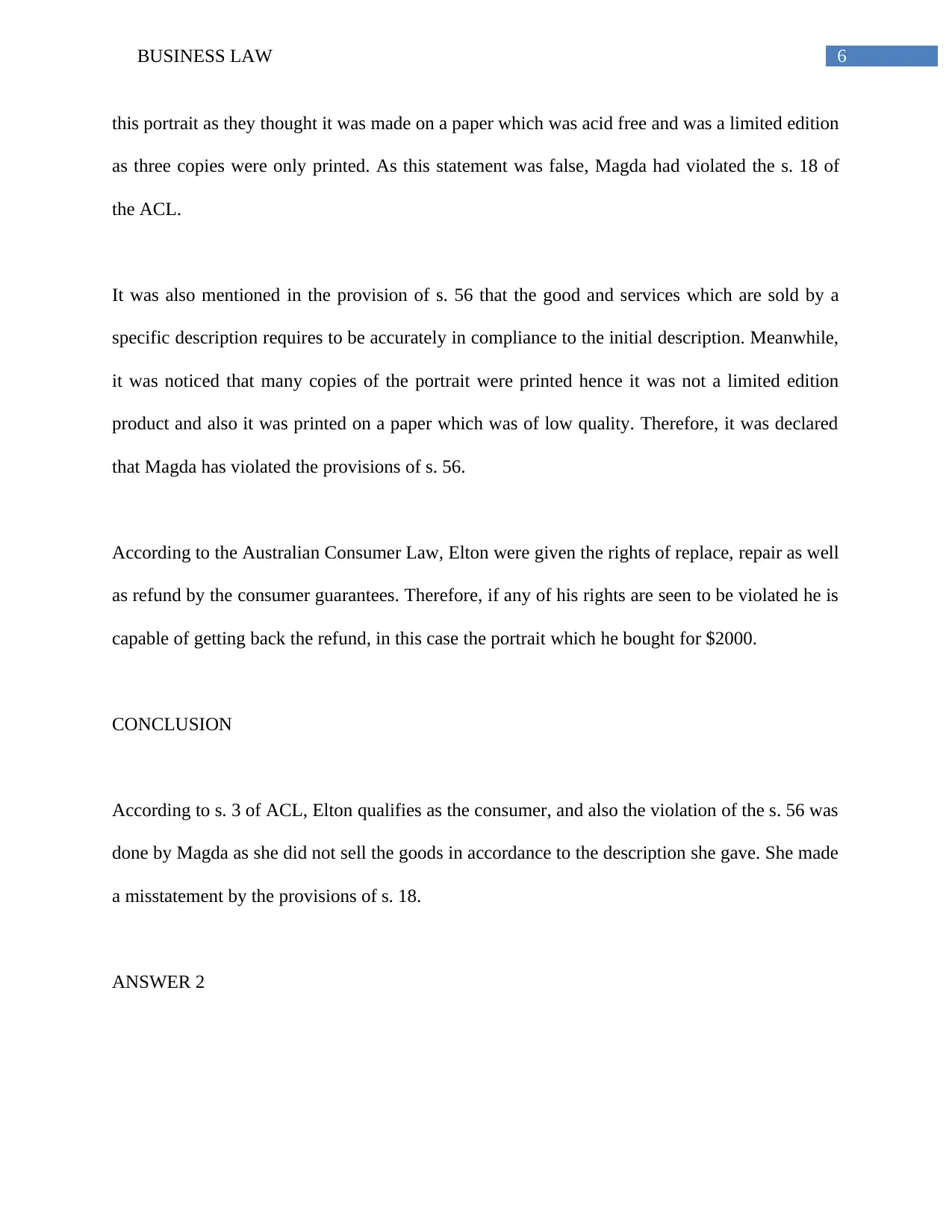
6BUSINESS LAW
this portrait as they thought it was made on a paper which was acid free and was a limited edition
as three copies were only printed. As this statement was false, Magda had violated the s. 18 of
the ACL.
It was also mentioned in the provision of s. 56 that the good and services which are sold by a
specific description requires to be accurately in compliance to the initial description. Meanwhile,
it was noticed that many copies of the portrait were printed hence it was not a limited edition
product and also it was printed on a paper which was of low quality. Therefore, it was declared
that Magda has violated the provisions of s. 56.
According to the Australian Consumer Law, Elton were given the rights of replace, repair as well
as refund by the consumer guarantees. Therefore, if any of his rights are seen to be violated he is
capable of getting back the refund, in this case the portrait which he bought for $2000.
CONCLUSION
According to s. 3 of ACL, Elton qualifies as the consumer, and also the violation of the s. 56 was
done by Magda as she did not sell the goods in accordance to the description she gave. She made
a misstatement by the provisions of s. 18.
ANSWER 2
this portrait as they thought it was made on a paper which was acid free and was a limited edition
as three copies were only printed. As this statement was false, Magda had violated the s. 18 of
the ACL.
It was also mentioned in the provision of s. 56 that the good and services which are sold by a
specific description requires to be accurately in compliance to the initial description. Meanwhile,
it was noticed that many copies of the portrait were printed hence it was not a limited edition
product and also it was printed on a paper which was of low quality. Therefore, it was declared
that Magda has violated the provisions of s. 56.
According to the Australian Consumer Law, Elton were given the rights of replace, repair as well
as refund by the consumer guarantees. Therefore, if any of his rights are seen to be violated he is
capable of getting back the refund, in this case the portrait which he bought for $2000.
CONCLUSION
According to s. 3 of ACL, Elton qualifies as the consumer, and also the violation of the s. 56 was
done by Magda as she did not sell the goods in accordance to the description she gave. She made
a misstatement by the provisions of s. 18.
ANSWER 2
Paraphrase This Document
Need a fresh take? Get an instant paraphrase of this document with our AI Paraphraser
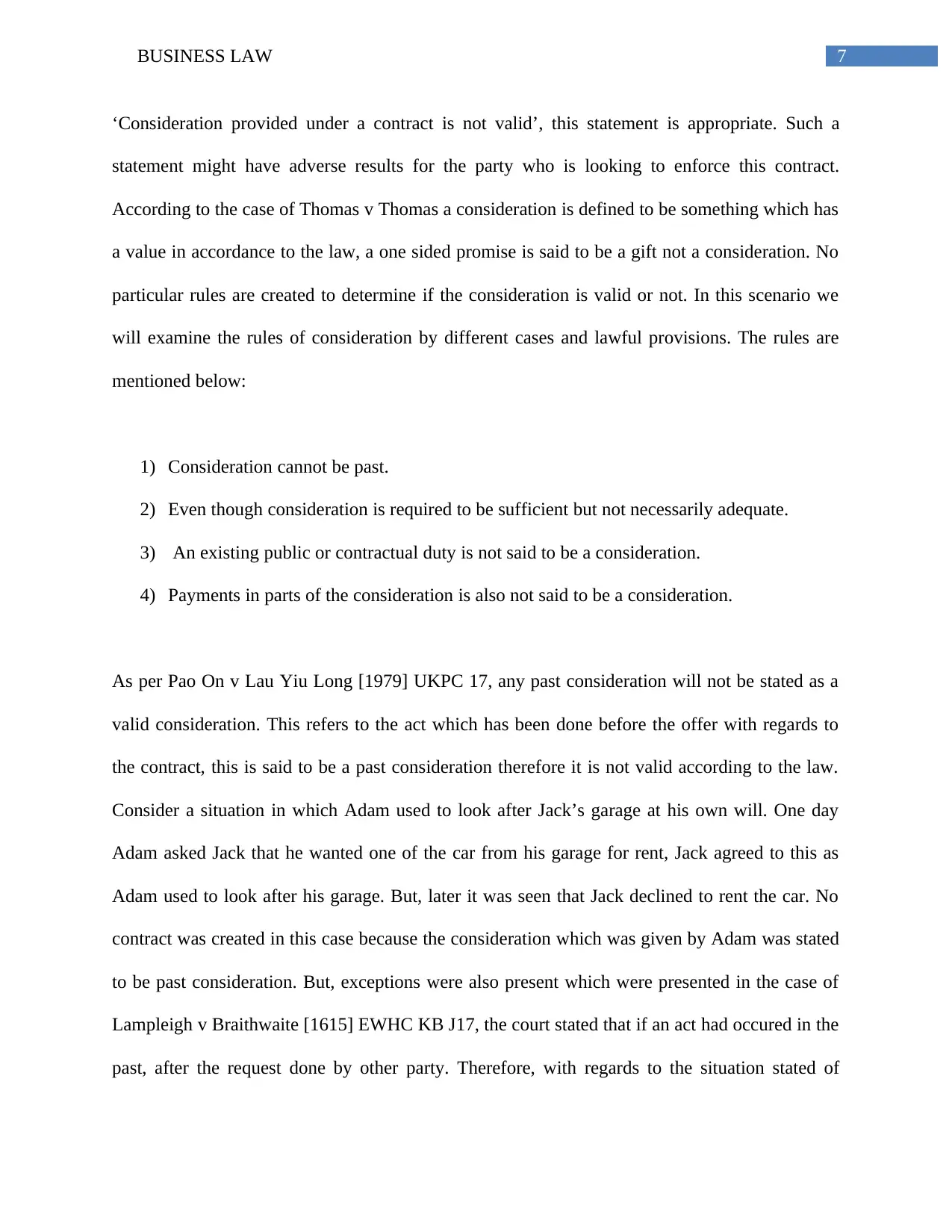
7BUSINESS LAW
‘Consideration provided under a contract is not valid’, this statement is appropriate. Such a
statement might have adverse results for the party who is looking to enforce this contract.
According to the case of Thomas v Thomas a consideration is defined to be something which has
a value in accordance to the law, a one sided promise is said to be a gift not a consideration. No
particular rules are created to determine if the consideration is valid or not. In this scenario we
will examine the rules of consideration by different cases and lawful provisions. The rules are
mentioned below:
1) Consideration cannot be past.
2) Even though consideration is required to be sufficient but not necessarily adequate.
3) An existing public or contractual duty is not said to be a consideration.
4) Payments in parts of the consideration is also not said to be a consideration.
As per Pao On v Lau Yiu Long [1979] UKPC 17, any past consideration will not be stated as a
valid consideration. This refers to the act which has been done before the offer with regards to
the contract, this is said to be a past consideration therefore it is not valid according to the law.
Consider a situation in which Adam used to look after Jack’s garage at his own will. One day
Adam asked Jack that he wanted one of the car from his garage for rent, Jack agreed to this as
Adam used to look after his garage. But, later it was seen that Jack declined to rent the car. No
contract was created in this case because the consideration which was given by Adam was stated
to be past consideration. But, exceptions were also present which were presented in the case of
Lampleigh v Braithwaite [1615] EWHC KB J17, the court stated that if an act had occured in the
past, after the request done by other party. Therefore, with regards to the situation stated of
‘Consideration provided under a contract is not valid’, this statement is appropriate. Such a
statement might have adverse results for the party who is looking to enforce this contract.
According to the case of Thomas v Thomas a consideration is defined to be something which has
a value in accordance to the law, a one sided promise is said to be a gift not a consideration. No
particular rules are created to determine if the consideration is valid or not. In this scenario we
will examine the rules of consideration by different cases and lawful provisions. The rules are
mentioned below:
1) Consideration cannot be past.
2) Even though consideration is required to be sufficient but not necessarily adequate.
3) An existing public or contractual duty is not said to be a consideration.
4) Payments in parts of the consideration is also not said to be a consideration.
As per Pao On v Lau Yiu Long [1979] UKPC 17, any past consideration will not be stated as a
valid consideration. This refers to the act which has been done before the offer with regards to
the contract, this is said to be a past consideration therefore it is not valid according to the law.
Consider a situation in which Adam used to look after Jack’s garage at his own will. One day
Adam asked Jack that he wanted one of the car from his garage for rent, Jack agreed to this as
Adam used to look after his garage. But, later it was seen that Jack declined to rent the car. No
contract was created in this case because the consideration which was given by Adam was stated
to be past consideration. But, exceptions were also present which were presented in the case of
Lampleigh v Braithwaite [1615] EWHC KB J17, the court stated that if an act had occured in the
past, after the request done by other party. Therefore, with regards to the situation stated of
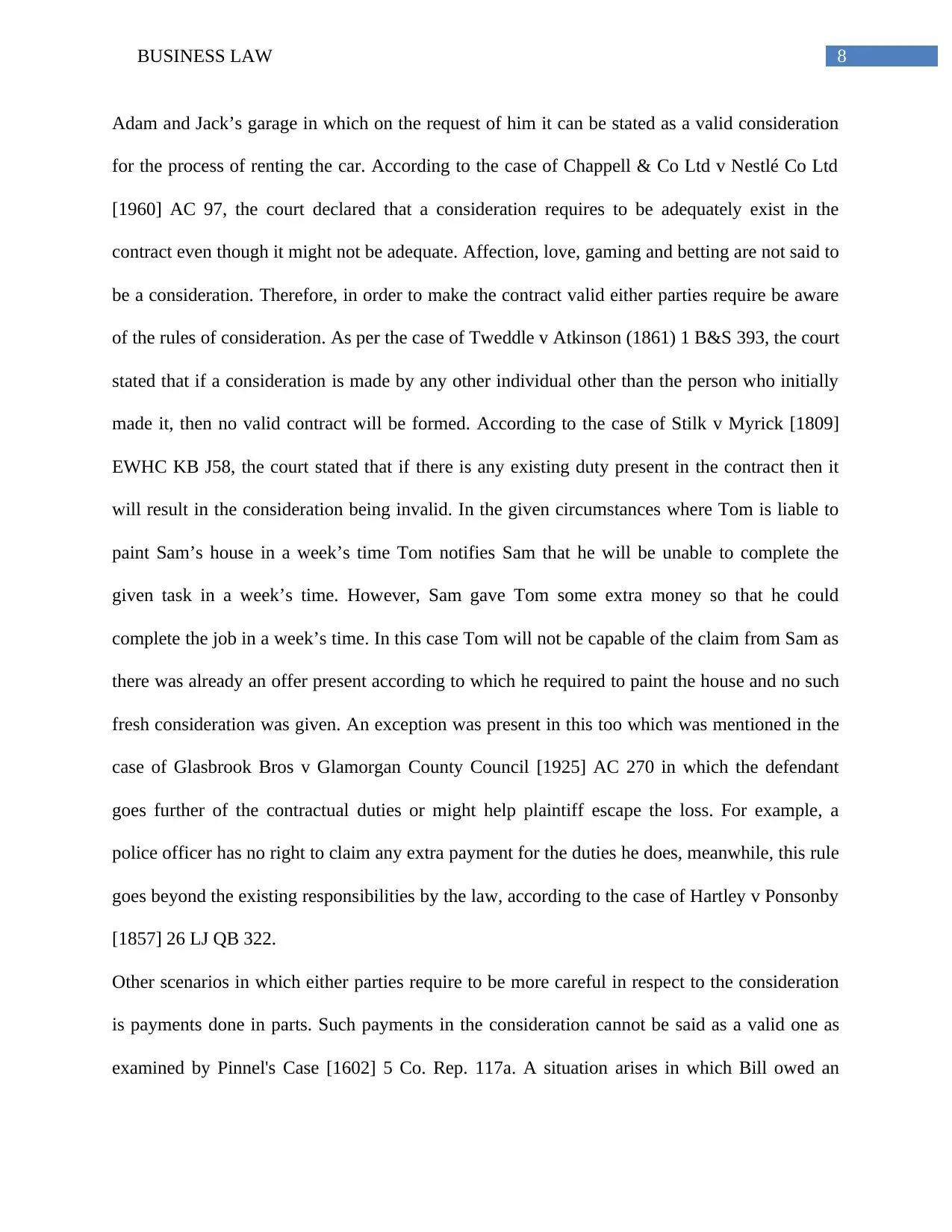
8BUSINESS LAW
Adam and Jack’s garage in which on the request of him it can be stated as a valid consideration
for the process of renting the car. According to the case of Chappell & Co Ltd v Nestlé Co Ltd
[1960] AC 97, the court declared that a consideration requires to be adequately exist in the
contract even though it might not be adequate. Affection, love, gaming and betting are not said to
be a consideration. Therefore, in order to make the contract valid either parties require be aware
of the rules of consideration. As per the case of Tweddle v Atkinson (1861) 1 B&S 393, the court
stated that if a consideration is made by any other individual other than the person who initially
made it, then no valid contract will be formed. According to the case of Stilk v Myrick [1809]
EWHC KB J58, the court stated that if there is any existing duty present in the contract then it
will result in the consideration being invalid. In the given circumstances where Tom is liable to
paint Sam’s house in a week’s time Tom notifies Sam that he will be unable to complete the
given task in a week’s time. However, Sam gave Tom some extra money so that he could
complete the job in a week’s time. In this case Tom will not be capable of the claim from Sam as
there was already an offer present according to which he required to paint the house and no such
fresh consideration was given. An exception was present in this too which was mentioned in the
case of Glasbrook Bros v Glamorgan County Council [1925] AC 270 in which the defendant
goes further of the contractual duties or might help plaintiff escape the loss. For example, a
police officer has no right to claim any extra payment for the duties he does, meanwhile, this rule
goes beyond the existing responsibilities by the law, according to the case of Hartley v Ponsonby
[1857] 26 LJ QB 322.
Other scenarios in which either parties require to be more careful in respect to the consideration
is payments done in parts. Such payments in the consideration cannot be said as a valid one as
examined by Pinnel's Case [1602] 5 Co. Rep. 117a. A situation arises in which Bill owed an
Adam and Jack’s garage in which on the request of him it can be stated as a valid consideration
for the process of renting the car. According to the case of Chappell & Co Ltd v Nestlé Co Ltd
[1960] AC 97, the court declared that a consideration requires to be adequately exist in the
contract even though it might not be adequate. Affection, love, gaming and betting are not said to
be a consideration. Therefore, in order to make the contract valid either parties require be aware
of the rules of consideration. As per the case of Tweddle v Atkinson (1861) 1 B&S 393, the court
stated that if a consideration is made by any other individual other than the person who initially
made it, then no valid contract will be formed. According to the case of Stilk v Myrick [1809]
EWHC KB J58, the court stated that if there is any existing duty present in the contract then it
will result in the consideration being invalid. In the given circumstances where Tom is liable to
paint Sam’s house in a week’s time Tom notifies Sam that he will be unable to complete the
given task in a week’s time. However, Sam gave Tom some extra money so that he could
complete the job in a week’s time. In this case Tom will not be capable of the claim from Sam as
there was already an offer present according to which he required to paint the house and no such
fresh consideration was given. An exception was present in this too which was mentioned in the
case of Glasbrook Bros v Glamorgan County Council [1925] AC 270 in which the defendant
goes further of the contractual duties or might help plaintiff escape the loss. For example, a
police officer has no right to claim any extra payment for the duties he does, meanwhile, this rule
goes beyond the existing responsibilities by the law, according to the case of Hartley v Ponsonby
[1857] 26 LJ QB 322.
Other scenarios in which either parties require to be more careful in respect to the consideration
is payments done in parts. Such payments in the consideration cannot be said as a valid one as
examined by Pinnel's Case [1602] 5 Co. Rep. 117a. A situation arises in which Bill owed an
⊘ This is a preview!⊘
Do you want full access?
Subscribe today to unlock all pages.

Trusted by 1+ million students worldwide
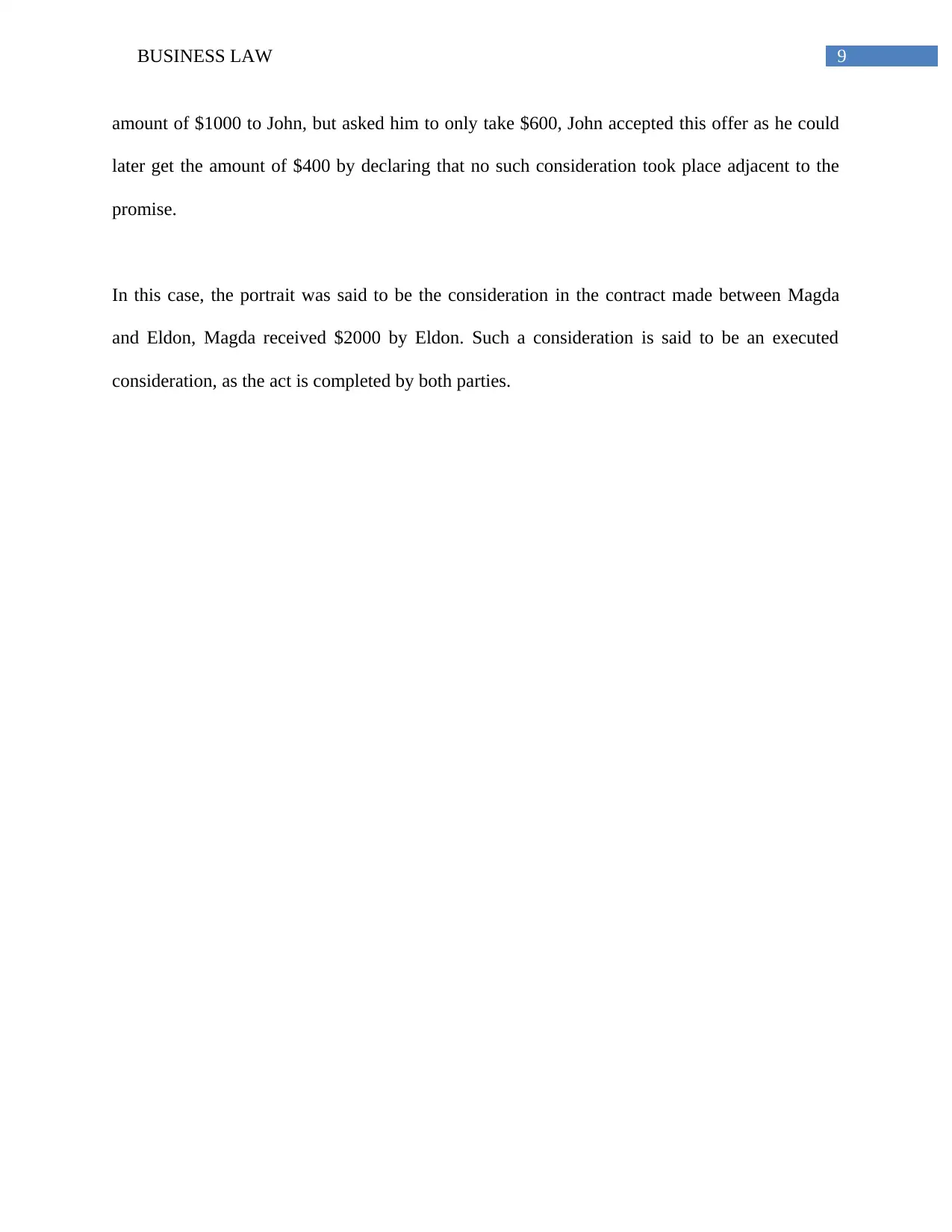
9BUSINESS LAW
amount of $1000 to John, but asked him to only take $600, John accepted this offer as he could
later get the amount of $400 by declaring that no such consideration took place adjacent to the
promise.
In this case, the portrait was said to be the consideration in the contract made between Magda
and Eldon, Magda received $2000 by Eldon. Such a consideration is said to be an executed
consideration, as the act is completed by both parties.
amount of $1000 to John, but asked him to only take $600, John accepted this offer as he could
later get the amount of $400 by declaring that no such consideration took place adjacent to the
promise.
In this case, the portrait was said to be the consideration in the contract made between Magda
and Eldon, Magda received $2000 by Eldon. Such a consideration is said to be an executed
consideration, as the act is completed by both parties.
Paraphrase This Document
Need a fresh take? Get an instant paraphrase of this document with our AI Paraphraser
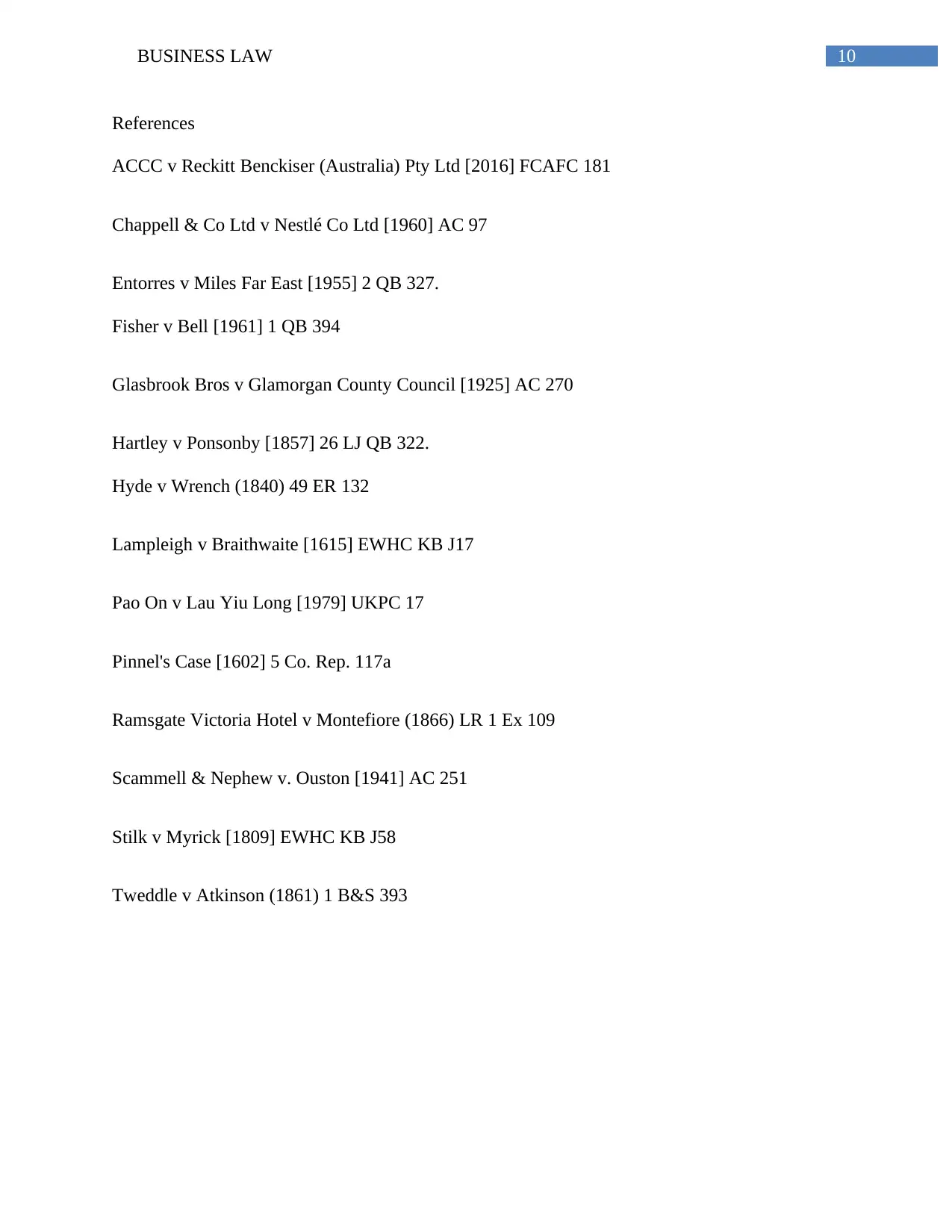
10BUSINESS LAW
References
ACCC v Reckitt Benckiser (Australia) Pty Ltd [2016] FCAFC 181
Chappell & Co Ltd v Nestlé Co Ltd [1960] AC 97
Entorres v Miles Far East [1955] 2 QB 327.
Fisher v Bell [1961] 1 QB 394
Glasbrook Bros v Glamorgan County Council [1925] AC 270
Hartley v Ponsonby [1857] 26 LJ QB 322.
Hyde v Wrench (1840) 49 ER 132
Lampleigh v Braithwaite [1615] EWHC KB J17
Pao On v Lau Yiu Long [1979] UKPC 17
Pinnel's Case [1602] 5 Co. Rep. 117a
Ramsgate Victoria Hotel v Montefiore (1866) LR 1 Ex 109
Scammell & Nephew v. Ouston [1941] AC 251
Stilk v Myrick [1809] EWHC KB J58
Tweddle v Atkinson (1861) 1 B&S 393
References
ACCC v Reckitt Benckiser (Australia) Pty Ltd [2016] FCAFC 181
Chappell & Co Ltd v Nestlé Co Ltd [1960] AC 97
Entorres v Miles Far East [1955] 2 QB 327.
Fisher v Bell [1961] 1 QB 394
Glasbrook Bros v Glamorgan County Council [1925] AC 270
Hartley v Ponsonby [1857] 26 LJ QB 322.
Hyde v Wrench (1840) 49 ER 132
Lampleigh v Braithwaite [1615] EWHC KB J17
Pao On v Lau Yiu Long [1979] UKPC 17
Pinnel's Case [1602] 5 Co. Rep. 117a
Ramsgate Victoria Hotel v Montefiore (1866) LR 1 Ex 109
Scammell & Nephew v. Ouston [1941] AC 251
Stilk v Myrick [1809] EWHC KB J58
Tweddle v Atkinson (1861) 1 B&S 393
1 out of 11
Related Documents
Your All-in-One AI-Powered Toolkit for Academic Success.
+13062052269
info@desklib.com
Available 24*7 on WhatsApp / Email
![[object Object]](/_next/static/media/star-bottom.7253800d.svg)
Unlock your academic potential
Copyright © 2020–2026 A2Z Services. All Rights Reserved. Developed and managed by ZUCOL.





